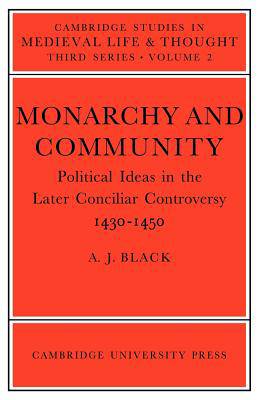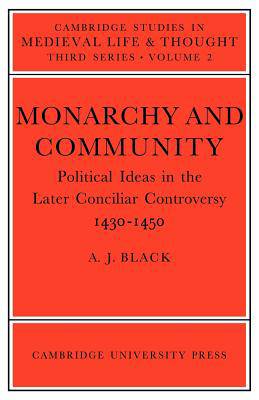
- Afhalen na 1 uur in een winkel met voorraad
- Gratis thuislevering in België vanaf € 30
- Ruim aanbod met 7 miljoen producten
- Afhalen na 1 uur in een winkel met voorraad
- Gratis thuislevering in België vanaf € 30
- Ruim aanbod met 7 miljoen producten
Zoeken
€ 66,45
+ 132 punten
Omschrijving
A study of political ideas in the conflict between the Council of Basle (1431-1449) and Pope Eugenius IV (1431-1447). The supporters of conciliar and papal supremacy each developed a remarkable array of political doctrines, which can now be seen as the immediate ancestors of later, more famous theories of 'democracy' and 'monarchy' respectively. Dr Black discusses both the development and the meaning of these doctrines, and their contribution to the notion of constitutional democracy and of monarchical sovereignty respectively. Both doctrines, he suggests, find a place in the modern state. He also examines the papacy's attempt to forge an international alliance of rulers, based on the monarchical view of sovereignty, against the Council. Extracts from writing of the two leading figures in the dispute, John of Segovia and John Turrecremata, are given in appendices.
Specificaties
Betrokkenen
- Auteur(s):
- Uitgeverij:
Inhoud
- Aantal bladzijden:
- 204
- Taal:
- Engels
- Reeks:
- Reeksnummer:
- nr. 2
Eigenschappen
- Productcode (EAN):
- 9780521023047
- Verschijningsdatum:
- 24/11/2005
- Uitvoering:
- Paperback
- Formaat:
- Trade paperback (VS)
- Afmetingen:
- 140 mm x 216 mm
- Gewicht:
- 294 g

Alleen bij Standaard Boekhandel
+ 132 punten op je klantenkaart van Standaard Boekhandel
Beoordelingen
We publiceren alleen reviews die voldoen aan de voorwaarden voor reviews. Bekijk onze voorwaarden voor reviews.











